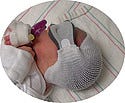Small Beginnings Inc: Born in the NICU
November 1, 2009
Working as a nurse in a neonatal intensive care unit (NICU), Mary Sharon Rogone was one of many female employees. But when she decided to start her own medical device company in the 1990s, she suddenly found herself in a male-dominated world.
“I am blond and have a small voice—at first no one took me seriously,“ Rogone says. Several men that Rogone tried to address at meetings would walk past her to talk to the man standing beside her. After learning that she was “the final decision maker,” one supplier still refused to talk to her, Rogone remembers.
It wasn't male affirmation that Rogone sought, but rather better treatment for premature infants. So she continued to push her Bili-Bonnet, a phototherapy mask for babies that suffer from jaundice due to a high level of bilirubin. The device shifts pressure from babies' ocular sockets to their cheekbones and blocks the penetatration of light. This phototherapy treatment helps to reduce babies' bilirubin levels.
The Early Years
Rogone developed the Bili-Bonnet while working in a NICU at a hospital in San Bernardino County, CA. Austin Webber, a medical sales representative, was impressed by the device and encouraged Rogone to commercialize it. They formed a partnership and put up $1500 each to start the business that would eventually become Small Beginnings Inc. “He found a way to manufacture the first product, and I set up the books, shipping, and the 800 number for orders,” Rogone says.
Rogone earned the patent for her Bili-Bonnet in 1997. Although she had no experience in this area, she wrote most of the patent herself. “An attorney added about six or seven words of correction,” she says.
A few years later, Small Beginnings was aided by the addition of Sharon's new husband Phil Rogone, a respiratory therapist and physician's assistant, and Ken Croteau, also a respiratory therapist. The group launched the Web site www.small-beginnings.com and started looking for distributors. In 2000, Rogone left her nursing job to devote her full attention to the CEO position.
|
To reduce its bilirubin levels, a baby is treated with a Bili-Bonnet. Image courtesy of Small Beginnings Inc. |
Cash flow was and continues to be a challenge for the Hesperia, CA–based manufacturer. “As a woman entrepreneur, with ideas that only professionals from the NICU could understand,” Rogone says that she's never been able to get a Small Business Administration loan. As a result, she bears much of the financial burden herself.
“I have invested everything I own, my retirement, my house, and my life into Small Beginnings because I believe it makes a difference in how infants are cared for on a global scale,” Rogone says.
Filling a Need
Despite the financial struggles, Small Beginnings has managed impressive growth. Rogone attributes its expansion to the strong need for products that address problems in the NICU. “Very large companies focus on how much profit they can suck out of the system; infants and their problems seem to be an afterthought,” she says. By focusing on a market segment that is small enough to be overlooked by other manufacturers, Small Beginnings has found its niche.
Over the past two decades, Small Beginnings has built up a portfolio of products that helps to fill the NICU vacuum. In addition to the Bili-Bonnet, some of the company's most popular products include:
•Bebeonkers. An oral and nasal suction device.
•Mem-Mover. A meconium aspirator.
•Cuddle Buns. Diapers with a nonexpanding crotch that prevents preemies' hips from developing abnormally.
•Pacee pacifier. Designed for breast-fed babies, the pacifier fits around endotracheal and feeding tubes.
The manufacturer develops some of its products but others, such as the Pacee pacifier, were invented by other healthcare professionals and licensed to Small Beginnings.
Today, Small Beginnings has annual sales of more than $1 million and its products are sold in more than 13 countries, according to Croteau, chief operating officer. Perhaps due to its niche focus, the company has proved resilient. Its growth has slowed down only about 4% during the recent economic downturn, the manufacturer says.
Although the company has skyrocketed since it was founded, its staff remains small. Six employees handle the entire operation, leaving the CEO with a hefty workload. “I wear many hats, and do a little bit of all jobs, from scrubbing the toilets to writing the checks, whatever it takes to make Small Beginnings grow,” Rogone says.
Going Forward
As she looks toward the future, the entrepreneur says that she would like to find a larger company willing to invest in her line of products. She thinks this would increase Small Beginnings' global presence in the NICU market and enable more babies to benefit from her inventions.
The NICU is a place of miracles, a place where babies weighing less than two pounds have a chance at survival. It breeds people like Mary Sharon Rogone — a woman who understands that health, be it a baby's or a company's, depends on both technological advances and hope.
Copyright ©2009 Medical Device & Diagnostic Industry
About the Author(s)
You May Also Like


.png?width=300&auto=webp&quality=80&disable=upscale)
